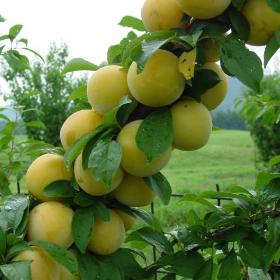OBILINAJA japanese plum DWARF (Krysmk 1)
Shipping calculated at checkout
14 in stock
Need more? Contact us
This tree needs pollination
Compatible trees:
SHIRO plum SEMI-DWARF (myrobalan) and DWARF
SHIRO plum SEMI-DWARF (myrobalan) and DWARF
SHIRO plum SEMI-DWARF (myrobalan) and DWARF
SHIRO plum SEMI-DWARF (myrobalan) and DWARF
AU ROSA japanese plum SEMI-DWARF (St Julien A)
AU ROSA japanese plum SEMI-DWARF (St Julien A)
Available only in spring 2026
🍑 Asian plum tree OBILINAJA
🌸 Origin and type
- Species: Asian hybrid (Prunus salicina × Prunus cerasifera)
- Origin: Nikitsky Botanical Garden, Crimea, 1960s
- Type: Japanese-Russian plum tree, adapted to cool climates
- Purpose: sweet and aromatic fruit, tree resistant to harsh winters
🌳 Tree characteristics
- Habit: rounded, vigorous and productive
- Mature height: 3–4 m
- Hardiness: USDA zones 5–8 (suitable for cold winters)
- Exposure: full sun
- Soil: fertile, deep, well-drained, sheltered from wind if possible
🍑 Fruit
- Size: medium
- Shape and skin: oval, red-purple skin with light bloom
- Flesh: yellow-orange with red areas, firm and juicy
- Flavor: sweet and aromatic
- Stone: semi-adherent
- Harvest: mid-season (between Methley and Shiro)
- Storage: approximately 3–4 weeks in a cool place
- Use: fresh consumption, jams, preserves
🌼 Flowering and pollination
- Flowering: mid-season (spring)
- Pollination: partially self-fertile, but cross-pollination recommended for optimal yield
- Recommended pollinators: Japanese plum trees or Asian hybrids flowering at the same time (e.g., Methley, Shiro, AU Rosa)
🛠️ Cultivation and care
- Planting: fall or early spring
- Watering: regularly for the first few years, then moderately
- Pruning: winter, to aerate the branches and promote light
- Thinning: recommended if the tree bears a lot of fruit
- Diseases: good resistance to scab and monilia, but vigilance recommended
🍽️ Uses
- Fresh fruit for eating
- Jams, preserves, and processing
- Can be dried
💡 Advantages
✅ Suitable for cold climates
✅ Aromatic and sweet fruit
✅ Productive and vigorous tree
✅ Good storage life and versatility of use
⚠️ Points to watch
- Cross-pollination strongly recommended
- Buds may be sensitive to late frosts in some very cold areas
- Harvest when fully ripe to enjoy the best flavor
Hardiness Zones
Number of years for production
4 ans





